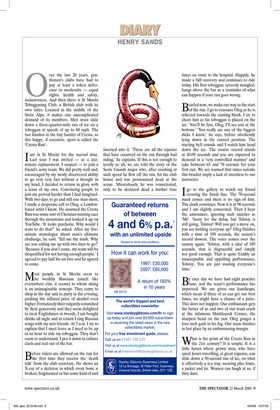O ver the last 20 years, gentlemen’s clubs have had to
pay at least a token deference to modernity — equal rights, health and safety, inclusiveness. And then there is St Moritz Tobogganing Club, a British club with its own rules. Located in the middle of the Swiss Alps, it makes one uncomplicated demand of its members. Men must slide down a three-quarter-mile run of ice on a toboggan at speeds of up to 80 mph. The run finishes in the tiny hamlet of Cresta, so this happy, if eccentric, sport is called the ‘Cresta Run’.
Iam in St Moritz for the second time. Last year I was invited — as a lastminute replacement, I suspect — to join a friend’s army team. We did pretty well and, encouraged by my newly discovered ability to go very very fast without a thought in my head, I decided to return in glory with a team of my own. Convincing people to join me proved harder than I had imagined. With two days to go and still one man short, I made a desperate call to Oleg, a Londonbased artist I know. He assumed the Cresta Run was some sort of Christian running race through the mountains and looked it up on YouTube. ‘It looks psychotic. Why would I want to do that?’ he asked. After my fiveminute monologue about man’s ultimate challenge, he said: ‘Tell me the truth. Why are you calling me up with two days to go?’ ‘Because if you don’t come, my team will be disqualified for not having enough people.’ I agreed to pay half his air fare and he agreed to come.
Most people in St Moritz seem to be wealthy Russians (much like everywhere else, it seems) to whom skiing is an unimaginable concept. They come to shop in the day and to party in the evening, pushing the inflated price of alcohol even higher. Fortunately their vulgarity is matched by their generosity and they seem delighted to treat Englishmen in tweeds. I am bought drinks all night and in return I sing Russian songs with my new friends. At 5 a.m. I try to explain that I must leave as I need to be up in an hour to ride my toboggan. They don’t seem to understand. I put it down to culture clash and reel out of the bar.
Before riders are allowed on the run for the first time they receive the ‘death talk’ from the club secretary. He shows an X-ray of a skeleton in which every bone is broken, fragmented or has some kind of nail inserted into it. ‘These are all the injuries that have occurred on the run through bad riding,’ he explains. If this is not enough to terrify us all, we are told the story of the Scots Guards major who, after crashing at such speed he flew off the run, hit the club house and was pronounced dead at the scene. Miraculously he was resuscitated, only to be declared dead a further four times en route to the hospital. Happily, he made a full recovery and continues to ride today. His first toboggan, severely mangled, hangs above the bar as a reminder of what can happen if your run goes wrong.
Briefed now, we make our way to the start of the run. I go to reassure Oleg as he is ushered towards the starting block. I try to cheer him as his toboggan is placed on the ice. ‘You’ll be fine, Oleg, I’ll see you at the bottom.’ ‘You really are one of the biggest dicks I know,’ he says, before obediently lying down in the correct position. The starting bell sounds and I watch him head down the ice. The course record stands at 40.09 seconds and you are expected to descend in a ‘very controlled manner’ and take between 65 and 70 seconds for your first run. We are warned that times outside this bracket imply a lack of attention to our instructor.
Igo to the gallery to watch my friend crossing the finish line. The 70-second mark comes and there is no sign of him. The clock continues. Now it is at 90 seconds and I am slightly concerned. Then I hear the announcer, ignoring such niceties as ‘Mr’. ‘Sorry for the delay, but Tolstoy is still going. Tolstoy! Will you get a move on, you are holding everyone up!’ Oleg finishes with a time of 109 seconds, the season’s record slowest. The voice comes over the tannoy again: ‘Tolstoy, with a time of 109 seconds, that is disgraceful and simply not good enough. That is quite frankly an unacceptable and appalling performance, Tolstoy. You are just wasting everyone’s time.’ By race day we have had eight practice runs, and the team’s performance has improved. We are given our handicaps, which mean if three of us can get our best times, we might have a chance of a prize. This does not happen. Our enthusiasm gets the better of us and two of our team crash at the infamous Shuttlecock Corner, the sharpest bend on the run. Oleg gouges a four-inch gash in his leg. Our team finishes in last place by an embarrassing margin.
What is the point of the Cresta Run in the 21st century? It is simple. It is a little haven where grown men, who have spent hours travelling, at great expense, can slide down a 50-second run of ice, on what is effectively a tea tray, wearing plus fours, a jacket and tie. Women can laugh at us, if they dare.


















































































 Previous page
Previous page